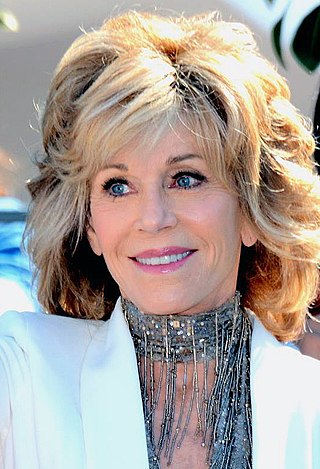
Jane Seymour Fonda is an American actress and activist. Recognized as a film icon, Fonda is the recipient of various accolades, including two Academy Awards, two British Academy Film Awards, seven Golden Globe Awards, a Primetime Emmy Award, the AFI Life Achievement Award, the Honorary Palme d'Or, and the Cecil B. DeMille Award.

Glynis Margaret Payne Johns is a British retired actress, dancer, musician and singer. In a career spanning eight decades on stage and screen, Johns appeared in more than 60 films and 30 plays. She has received various accolades throughout her career, including a Tony Award and a Drama Desk Award as well as nominations for an Academy Award, a Golden Globe Award, and a Laurence Olivier Award. She is widely considered as being one of the last surviving major stars from the Golden Age of Hollywood and classical years of British cinema.
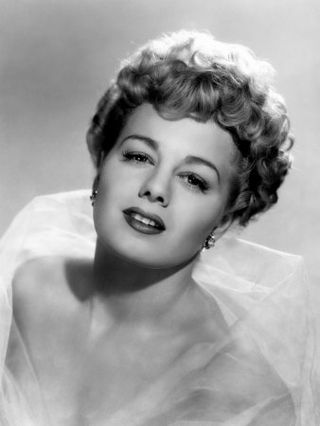
Shelley Winters was an American actress whose career spanned seven decades. She appeared in numerous films. She won Academy Awards for The Diary of Anne Frank (1959) and A Patch of Blue (1965), and received nominations for A Place in the Sun (1951) and The Poseidon Adventure (1972). She also appeared in A Double Life (1947), The Night of the Hunter (1955), Lolita (1962), Alfie (1966), Next Stop, Greenwich Village (1976), and Pete's Dragon (1977). In addition to film, Winters appeared in television, including a tenure on the sitcom Roseanne, and wrote three autobiographical books.

Darryl Francis Zanuck was an American film producer and studio executive; he earlier contributed stories for films starting in the silent era. He played a major part in the Hollywood studio system as one of its longest survivors. He produced three films that won the Academy Award for Best Picture during his tenure.
Stephanie Zimbalist is an American actress best known for her role as Laura Holt in the NBC detective series Remington Steele.
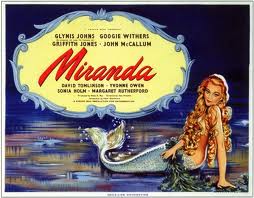
Miranda is a 1948 black and white British comedy film, directed by Ken Annakin and written by Peter Blackmore, who also wrote the play of the same name from which the film was adapted. The film stars Glynis Johns, Googie Withers, Griffith Jones, Margaret Rutherford, John McCallum and David Tomlinson. Denis Waldock provided additional dialogue. Music for the film was played by the London Symphony Orchestra, conducted by Muir Mathieson. The sound director was B. C. Sewell.

Efrem Zimbalist Jr. was an American actor best known for his starring roles in the television series 77 Sunset Strip and The F.B.I. He is also known as recurring character "Dandy Jim Buckley" in the series Maverick and as the voice of Alfred Pennyworth in the DC Animated Universe.

Andrew Duggan was an American character actor. His work includes 185 screen credits between 1949 and 1987 for roles in both film and television, as well a number more on stage.
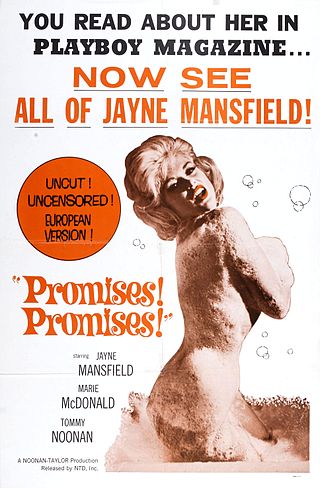
Promises! Promises! is a 1963 American sex comedy film directed by King Donovan and starring Tommy Noonan and Jayne Mansfield. Released at the end of the Production Code era and before the MPAA film rating system became effective in 1968, it was the first Hollywood film of the sound era to feature nudity by a mainstream star (Mansfield).
The 20th Golden Globe Awards, honoring the best in film and television for 1962, were held on March 5, 1963.

Girl on the Run is a 1958 private detective film directed by Richard L. Bare and starring Efrem Zimbalist Jr., Erin O'Brien, Shepperd Strudwick, Edd Byrnes and Barton MacLane.
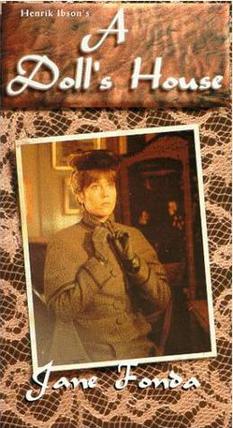
A Doll's House is a 1973 drama film directed by Joseph Losey, based on the 1879 play A Doll's House by Henrik Ibsen. It stars Jane Fonda in the role of Nora Helmer and David Warner as her domineering husband, Torvald.
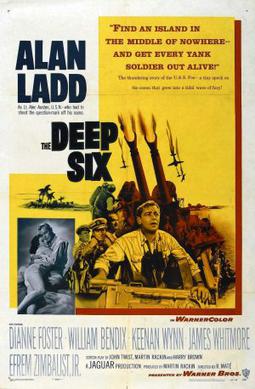
The Deep Six is a 1958 American World War II drama film directed by Rudolph Maté, loosely based on a novel of the same name by Martin Dibner. The film stars Alan Ladd, who co-produced it, William Bendix, Dianne Foster, Keenan Wynn, James Whitmore, and Efrem Zimbalist Jr. It also marked the film debut of Joey Bishop. It was distributed by Warner Bros.
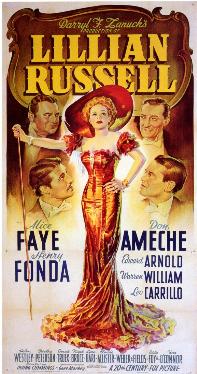
Lillian Russell is a 1940 American biographical film of the life of the singer and actress. The screenplay was by William Anthony McGuire. The film was directed by Irving Cummings and produced by Darryl F. Zanuck. It stars Alice Faye in the title role, Don Ameche, Henry Fonda and Edward Arnold as Diamond Jim Brady.

The Awakening is a 1980 British horror film directed by Mike Newell in his directorial debut and starring Charlton Heston, Susannah York, and Stephanie Zimbalist. It is the third film version of Bram Stoker's 1903 novel The Jewel of Seven Stars, following the 1970 television adaptation as The Curse of the Mummy for the TV series Mystery and Imagination, and the 1971 theatrical film by Hammer, Blood from the Mummy's Tomb. It was released by Warner Bros.
The Model and the Marriage Broker is a 1951 American romantic comedy film about a marriage broker. Though Jeanne Crain is top billed, the movie revolves around Thelma Ritter's character, in a rare leading role for Ritter. Scott Brady also stars. The film is directed by George Cukor and produced by Charles Brackett. At the 24th Academy Awards, it received a nomination in the category of Best Costume Design for Charles LeMaire and Renié. The award, however, went to Edith Head for her work in A Place in the Sun.

Sex and the Single Girl is a 1964 American Technicolor comedy film directed by Richard Quine and starring Tony Curtis, Natalie Wood, Henry Fonda, Lauren Bacall and Mel Ferrer.

Scruples is a 1980 American television miniseries based on the 1978 novel by Judith Krantz. It was produced by Warner Bros. Television and starred Lindsay Wagner. Scruples included the final screen appearance of Gene Tierney.

Randy Stuart, was an American actress in film and television. A familiar face in several popular films of the 1940s and 1950s, and later in western-themed television series, she is perhaps best remembered as Louise Carey, the wife of Scott Carey, played by Grant Williams, in The Incredible Shrinking Man (1957).

Home Before Dark is a 1958 American Warner Brothers dark drama film, directed and produced by Mervyn LeRoy, and starring Jean Simmons, Dan O'Herlihy, Rhonda Fleming, and Efrem Zimbalist Jr. The screenplay was written by Eileen and Robert Bassing, based on the novel by Eileen Bassing. The title song was written by Sammy Cahn with music by Jimmy McHugh.

















